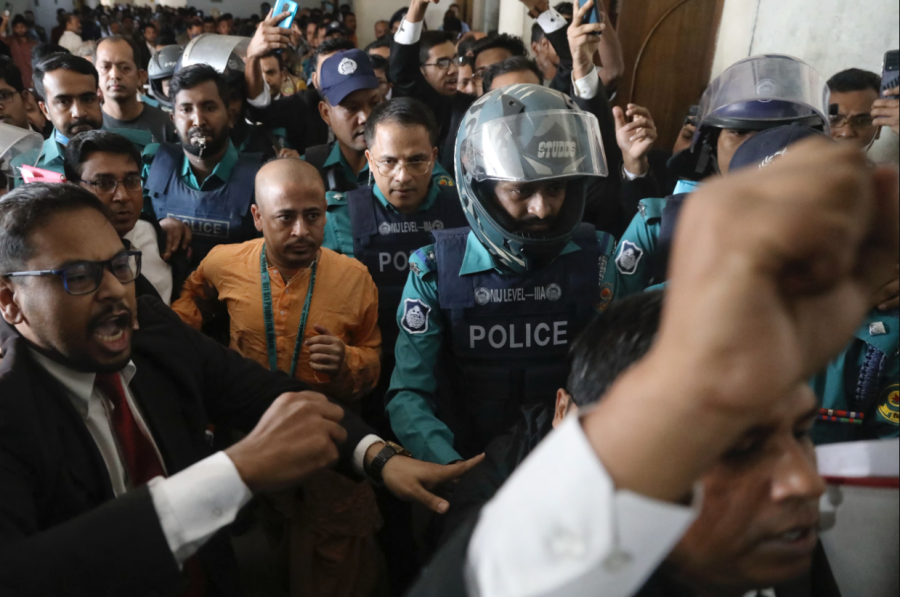Columns
Where is Bangladesh heading?
The country’s new leaders are beset with challenges to its democracy.
Manoj Misra
When student-led, anti-government protests in Bangladesh snowballed into the ouster of Sheikh Hasina’s 15-year-long autocratic rule in August 2024, many in the South Asian nation hoped it signalled better times ahead.
Four months on, things are not going to plan. The initial surge of public jubilation has given way to pessimism. The interim government, led by Nobel laureate Muhammad Yunus, is grappling with governance problems, political instability, religious extremism and a fragile economy. Moreover, a series of recent events have highlighted and exacerbated Bangladesh’s fraught diplomatic relations with neighbouring India.
The arrest of a Hindu monk in Muslim-majority Bangladesh on Nov. 24, 2024, encapsulates the problems facing Yunus. The detention of Chinmoy Krishna Das (also known as Chandan Dhar) was followed by sectarian violence in which a Muslim lawyer was killed and anti-Bangladesh protests in India.
As an expert on Bangladesh’s political and social landscape and a former Indian High Commission employee in Dhaka, I believe it is clear that how Yunus addresses myriad challenges—upholding the rule of law, managing the economy, ensuring safety for minorities and rebuilding relations with India—will be critical for restoring democratic health in Bangladesh.
A public safety crisis
The interim government’s immediate challenge is addressing deteriorating law and order.
While Hasina’s authoritarian rule left little space for democracy or dissent, her abrupt removal in August has created a power vacuum in which previously marginalised political factions compete for influence and public support.
This has coincided with a rise in vigilante justice, extortion and the abuse of the legal system for settling political disputes. The mob lynching of 49 people, mostly political opponents, since Hasina’s ouster is symptomatic of Bangladesh’s current lawlessness.
The police’s reluctance to address this security vacuum has only worsened the situation. Law enforcement’s heavy-handed response to anti-Hasina protests generated widespread anger among Bangladeshis.
Following Hasina’s fall, angry mobs set fire to numerous police stations and killed 44 on-duty policemen. Much of the police force has become demoralised, fearful and hesitant to enforce lawful crowd-control measures.
An economy in crisis
Making matters worse, years of economic mismanagement and corruption have left Bangladesh struggling with high youth unemployment, runaway inflation and a collapsing banking sector. Its external debt has jumped from US$62 billion to over $100 billion in just five years, which critics have blamed, in part, on large infrastructure projects rife with corruption.
Managing this debt will pose a significant challenge. Bangladesh’s dwindling foreign reserves make debt repayments and currency stabilization difficult, while also exerting inflationary pressure on the economy. And inflation remains persistently high, with essential goods becoming increasingly unaffordable for many Bangladeshis.
Adding to these problems is a wave of labour unrest. Workers across various sectors have organised protests over unpaid wages and unsafe working conditions. Some of this labour unrest has turned violent, forcing hundreds of factories to shut down. Moreover, factories owned by individuals close to the Hasina government have also been targeted, including a suspected arson attack of a tire factory.
The bleak economic situation and ongoing labor unrest has seriously affected the garment sector, Bangladesh’s main foreign export, which threatens international demand and could further imperil the economy.
The return of extremism
The challenges faced by Bangladesh’s interim government have been exacerbated by the resurgence of Islamic extremism and sectarian violence that have long plagued Bangladesh, particularly since the return of Bangladeshi mujahadeen fighters after the Afghan-Soviet war.
Though temporarily suppressed during Hasina’s authoritarian rule, Islamic extremists and vigilantes have gained confidence in recent months and have violently attacked religious and ethnic minorities, as well as sex workers. Vigilantes have destroyed thousands of Hindu homes, businesses and places of worship across the country, causing deep insecurity within the minority Hindu community, which makes up 8 percent of the population. Extremists have also vandalised about 40 Sufi Muslim shrines.
Meanwhile, Bengali Muslim settlers have attacked ethnic Indigenous groups in the Chittagong Hill Tracts in the country’s southeast, resulting in the deaths of at least three people and the burning of numerous homes and businesses.
The recent violent attacks on the offices of two leading newspapers, which had been accused of anti-Islamic bias, further highlight the threat posed by emboldened religious extremists.
Neighbourly squabbles
Attacks on Hindus have also strained diplomatic relations with neighbouring India.
Under Hasina, Bangladesh maintained a close alliance with India and Prime Minister Narendra Modi. In addition to joint security collaboration to counter Chinese influence in South Asia, Delhi has also made substantial infrastructure investments in Bangladesh, including $8 billion in loans for various development projects.
But Indian-Bangladeshi relations have been tense following Hasina’s ouster. The former autocratic leader fled to Delhi, where she currently resides, despite plans by the interim government to seek her extradition. Yunus has accused Hasina of continuing her political operations and trying to undermine Bangladesh’s new leaders while being harboured by India.
The arrest of Chinmoy Krishna Das on sedition charges has only exacerbated Indian-Bangladeshi tensions. India’s government has expressed “deep concern” over the monk’s arrest and called for the protection of Hindus in Bangladesh.
The chief minister of West Bengal, India, called for deploying a United Nations-led peacekeeping force in Bangladesh to safeguard minorities, while some leaders from India’s ruling Hindu nationalist BJP party have demanded trade embargoes on Bangladesh.
India holds significant leverage over Bangladesh, both economically and geopolitically. With bilateral trade volumes of $14 billion, India is Bangladesh’s largest trading partner and a key source of essential imports. If India perceives the new government as hostile, it could impose punitive measures that might further cripple Bangladesh’s fragile economy, similar to its unofficial blockade of Nepal in 2015 that led to a severe humanitarian crisis.
The Indian High Commission in Dhaka is highly influential and deeply connected to Bangladeshi politics. A key part of its influence comes from issuing about 2.5 million visas each year to Bangladeshis travelling to India for medical and other reasons. Since Hasina’s fall, India has restricted the issuing of these visas.
A return of autocratic rule?
Given the two countries’ deep economic ties and geographic proximity, I believe Yunus needs to delicately navigate bilateral relations with India. He has to be particularly mindful that Hasina’s current exile in India and the ongoing attacks on Hindu minorities in Bangladesh could provide India with a pretext to more strongly intervene in Bangladeshi politics.
Bangladesh’s current trajectory is, I believe, worrying. How the Yunus government deals with these heightened risks will say a lot about the future direction of the country. Indeed, any failure in these areas could lead to yet more instability, complicating the country’s long-term prospects and making it easier to envision the return of an authoritarian regime.
–The Conversation




 11.01°C Kathmandu
11.01°C Kathmandu















